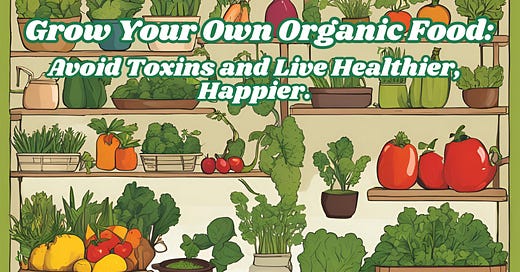How to Grow Your Own Organic Food: A Complete Guide to Avoiding Toxic Supermarket Products and Living a Healthier, Happier Life
In today's world, where concerns about food safety, and nutritional value are ever-growing, growing your own food emerges as a rewarding solution. Not only does it allow you to control what goes into your food, but it also connects you with nature.
Growing your own food can be an empowering way to ensure what you're eating is fresh, healthy, and free from unwanted chemicals. With the increasing prevalence of pesticides, genetically modified organisms (GMOs), and synthetic chemicals in store-bought food, many people are seeking healthier alternatives. Growing your own food offers a way to regain control over what you consume, ensuring it is free from toxins and packed with nutrients. In this article, we will explore in detail how you can grow your own food, avoid harmful supermarket products, and live a healthier and happier life.
Why Grow Your Own Food?
Avoid Toxins: Supermarket produce often comes with a history of pesticides, herbicides, and other chemicals. By growing your own, you control what, if any, chemicals are used.
Freshness and Nutrition: Homegrown food can be picked at peak ripeness, offering superior taste and nutrient content compared to store-bought produce which might have traveled long distances.
Economic Benefits: Over time, gardening can save money on grocery bills, especially with rising food costs.
Mental and Physical Health: Gardening is a physical activity that can reduce stress, increase mindfulness, and provide a sense of accomplishment.
Getting Started Assess Your Space
Urban Gardening: Use balconies, rooftops, or windowsills for container gardening. Vertical gardens are excellent for small spaces.
Suburban and Rural Areas: You have the luxury of ground plots or raised beds. Consider space for composting.
Choosing What to Grow
Start Simple: Begin with herbs like basil, mint, or parsley. Move on to vegetables like tomatoes, lettuce, or peppers which are relatively easy to grow.
Consider Your Diet: Grow what you love to eat. If you enjoy salads, focus on greens and vegetables that can be continually harvested.
Seasonal Planning: Learn which plants thrive in which seasons in your climate zone to ensure year-round produce.
10 Foods You Can Grow In Your House Or Garden:
Soil and Seeds
Soil Quality: Good soil is fundamental. Use compost, organic matter, or purchase organic soil mix. Test your soil for nutrients and pH if possible.
Seeds: Opt for organic, heirloom, or non-GMO seeds to avoid genetically modified organisms and to support biodiversity.
Pest and Disease Management
Natural Remedies: Use neem oil, insecticidal soaps, or introduce beneficial insects like ladybugs.
Physical Barriers: Netting can protect against birds and some insects, while mulch can prevent weed growth and retain moisture.
Watering and Maintenance
Efficient Watering: Drip irrigation or soaker hoses save water. Collect rainwater for an eco-friendly approach.
Mulching: Helps in weed control, moisture retention, and adds organic matter as it breaks down.
Harvesting
Timing: Harvest in the morning for most vegetables when they're most hydrated.
Use: Enjoy immediately for maximum nutrition or learn preserving techniques like canning, freezing, or drying.
Sustainability and Continuous Learning
Composting: Turn kitchen waste into garden gold. Composting reduces waste and enriches your soil.
Seed Saving: Preserve seeds from your best plants for the next season, promoting sustainability.
Education: Continuously learn from books, online resources, or community workshops. Gardening is as much about learning as it is about growing.
Electroculture Gardening Techniques for Beginners
Community and Sharing
Share Knowledge and Produce: Engage with neighbors or online communities. Swap seeds, share surplus harvest, and exchange tips.
Community Gardens: If space is an issue, or for social benefits, participate in or start a community garden.
As a full-time researcher, I rely on your support. If you find my work valuable, I kindly invite you to consider subscribing to the paid version of my newsletter, it will help me a lot. I aim to continue providing well-researched content, educating you, and providing exceptional value through my work.
Conclusion
Growing your own food isn't just about avoiding the potential toxins in supermarket produce; it's a lifestyle choice that promotes health, sustainability, and community. Each seed planted is a step towards self-sufficiency, environmental stewardship, and a more engaged, joyful life. Whether you're tending to a small herb garden on your windowsill or managing a backyard plot, the journey of growing your food is rewarding in countless ways.






